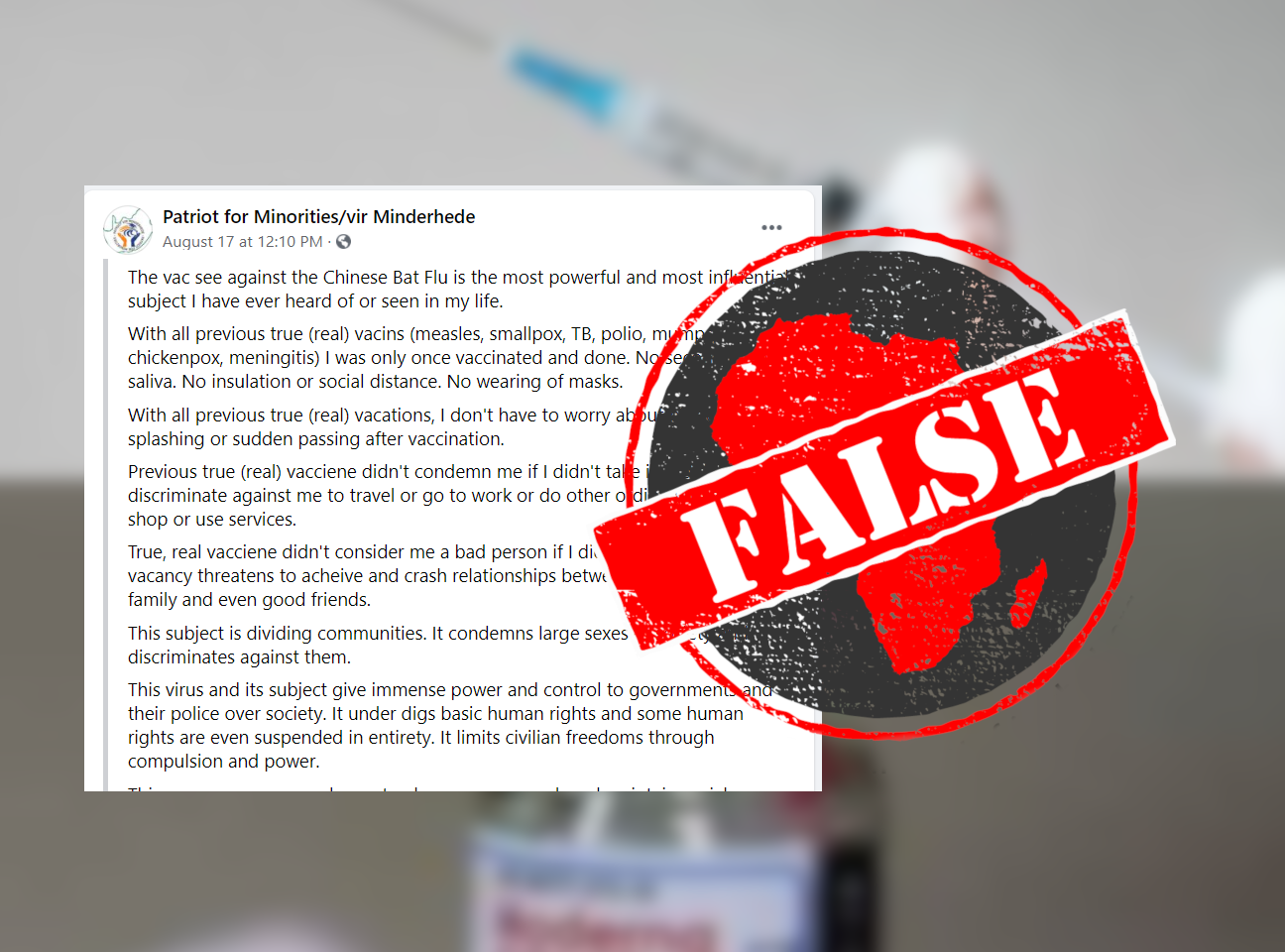A Facebook post, written in Afrikaans, shared widely and copied in South Africa, implies that vaccines against Covid-19, some of which are delivered through multiple injections, are not “real” vaccines.
It says: “Met alle vorige ware (egte) vaksiene (masels, pokke, TB, polio, pampoentjies, waterpokkies, meningitis) was ek slegs eenmaal ingeënt en klaar. Geen tweede of derde spuite nie.”
This roughly translates to: “With all previous true (real) vaccines (measles, smallpox, TB, polio, mumps, chickenpox, meningitis) I was only vaccinated once. No second or third injections.”
But this is not true and the post makes several other incorrect claims about Covid-19 vaccines.

Many vaccines require multiple shots, including for diseases listed
Although the Facebook post lists several vaccines which it claims require no second or third injections, several of these vaccines are typically delivered in multiple injections.
The World Health Organization (WHO) recommends that children should receive two doses of the measles vaccine “to ensure immunity and prevent outbreaks, as about 15% of vaccinated children fail to develop immunity from the first dose”.
The United States Centers for Disease Control (CDC) recommends a schedule of four doses of the polio vaccine for children. It also advises that “adults who are at increased risk of exposure to poliovirus” should receive one lifetime booster dose of the vaccine, even if they were fully vaccinated as children.
The CDC also recommends two doses of the chickenpox vaccine for all people, with different schedules depending on age, even if they have been exposed to the virus.
Some of the available Covid-19 vaccines, though not all, do require multiple injections, but this is not unique or unusual.
Covid vaccines are approved for use, not ‘experimental’
The misleading Facebook post also claims that the Covid-19 vaccine “is nog in sy eksperimentele fase” and “sal eers twee jaar (of langer) van nou af klaar wees met kliniese proewe en die laboratorium fase”. That is, the vaccine “is still in its experimental phase and “the clinical trials and the laboratory phase will only be finished two years (or longer) from now”.
This is not the first time it has been claimed that vaccines against Covid-19 are “experimental” or have not been demonstrated to be safe. However, in order to be approved for public use, vaccines and other drugs undergo a strict approval process in all countries, and this is also true for the Covid-19 vaccines.
Africa Check has published fact-sheets on how vaccines are approved in South Africa, Nigeria and Kenya.
All of the vaccines approved for use in preventing Covid-19 have been found to be safe and effective in large-scale clinical trials.
Vaccines lower risk of getting or dying from Covid
The post also claims that the vaccine “doen eintlik alle ander skadelike dinge, BEHALWE die EEN ding wat dit veronderstel is om te doen: om mense teen die virus te immuniseer”. This means that the vaccine “does all sorts of other harmful things, EXCEPT the ONE thing that it is supposed to do: immunise people against the virus”.
This is also untrue. Not only have clinical trials shown that vaccines are effective, but as more countries vaccinate large proportions of their populations, there is increasingly overwhelming evidence that vaccines lower the risk of contracting or dying from Covid-19.
In two studies conducted in Israel, where a large proportion of the population was vaccinated relatively quickly, the Pfizer-BioNTech Covid-19 vaccine was found to radically decrease the chances of contracting or dying from Covid-19.
The first study, published in the New England Journal of Medicine in April 2021, studied two groups of nearly 600,000 people, one group which received the vaccine, and one which did not. It confirmed that the vaccine was effective at preventing symptomatic Covid-19, death, and a number of other outcomes, confirming the results of clinical trials.
The second study, published in the Lancet in May, concluded that the vaccine was “highly effective across all age groups […] in preventing symptomatic and asymptomatic SARS-CoV-2 infections and Covid-19-related hospitalisations, severe disease, and death”.
A review of several large real-world studies, from August, analysed the effectiveness of three Covid-19 vaccines across five countries. Among other findings, the report concluded: “Most importantly, the currently available Covid‐19 vaccines appear to be very effective in preventing severe complications and deaths from Covid‐19 in adults of all ages.”
There is no proof for these misleading claims made in this Facebook post. But there is plenty of compelling evidence that the available vaccines against Covid-19, whether administered in one or two doses, prevent the spread of the disease and dying from it.
Republish our content for free
For publishers: what to do if your post is rated false
A fact-checker has rated your Facebook or Instagram post as “false”, “altered”, “partly false” or “missing context”. This could have serious consequences. What do you do?
Click on our guide for the steps you should follow.
Publishers guideAfrica Check teams up with Facebook
Africa Check is a partner in Meta's third-party fact-checking programme to help stop the spread of false information on social media.
The content we rate as “false” will be downgraded on Facebook and Instagram. This means fewer people will see it.
You can also help identify false information on Facebook. This guide explains how.





Add new comment